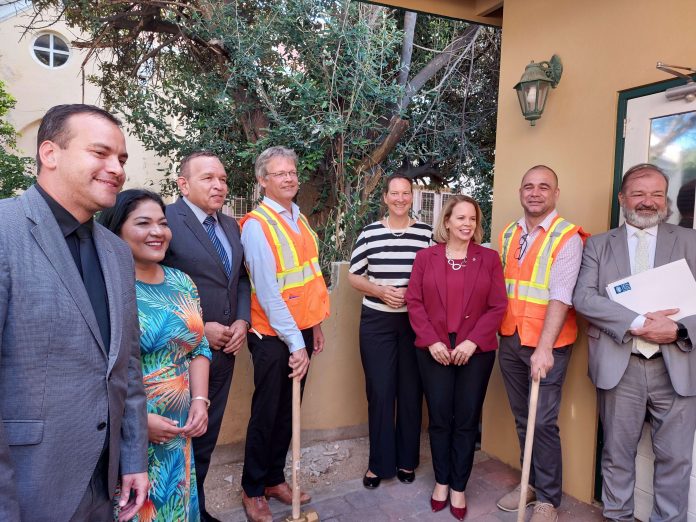(Oranjestad)—Yesterday evening at the University of Aruba, an official symbolic act of submission took place, where the monument of the Maria Convent was submitted for the renovation of this historical building. The purpose of this was to give space for the University’s SISSTEM faculty (Sustainable Island Solutions through Science, Technology, Engineering and Mathematics).
Among the attendees were the Prime Minister Evelyn Wever-Croes and several other ministers, along with representatives of the United Nations Development Program (UNDP), University of Aruba and the European Delegations Committee (virtually).
With help from the European Development Fund, the SISSTEM project received 13 million euros in financial support in total. The faculty of SISSTEM at the university consists of a Bachelor program in STEM (which started in 2019), a Master’s program and a PHD research program that focuses on sustainable development in the Small Island Developing States (SIDS).
Mr. Gerard Noto, Resident Representative of the UNDP for Trinidad and Tobago, Aruba, Curacao and St. Maarten, indicated how this project correlates and supports the goals of the UNDP.
“SISSTEM is a strategic initiative, and a strong foundation for the development and implementation of technological innovations, renewable resources and adaptation and mitigation of climate change,” Noto remarked.
The faculty’s goal is to educate a new generation of scientists and engineers who will support sustainability, diversify the local economy, reduce the dependency on fossil fuels and improve the capabilities of the SIDS to recover from disasters.
The faculty incorporates sustainability management on an academic level, while also strengthening the regional labor force with means necessary. There is hope that the faculty could be a center of excellence and renown in the SIDS region around the world.
The establishment of the faculty is funded by the UN and implemented by UNDP, in coordination with the University of Aruba and Catholic University of Leuven in Belgium (KU Leuven).
In July 2019, the UN gave the UNDP the task to implement the renovation of the Maria Convent national monument. Additionally, the organization was also given the task of implementing the construction of laboratories for the faculty.
Offer planning for the renovation of this building started back in November 2020, and by February, 2021, the offer was still open. The first round of offers was not successful, because of the costs of material and the effects of the COVID-19 pandemic. Nonetheless, this did not stop the process, and UNDP, along with the university, arranged several meetings in October 2021 for the revision of the project.
The second round of offers was launched in February 2020, and even though it was a long process, they finally signed a contract with ALBO Aruba N.V. for the completion of the renovation.
Prime Minister Wever-Croes ratified the importance of a higher educational level in the formation and development of the community in order to create more opportunity for an economic development.
At the same time, she thanked the UN for their partnership, which made financing possible for the development of the programs’ curricula in colaboration with KU Leuven, and for the building to house the faculty.
Minister Geoffrey Wever expressed that as the Minister of Sustainable Development, he believes that it is essential to focus on sustainable development of this country, taking in account its people and the rest of the world: “That’s why I’m very happy to hear that the university focuses on providing knowledge and creating capacity for the future doctors.”
He explained that the expansion of more classrooms and ofices for the university is an important part of the development of Aruba, and the cooperation with the UN showed that partnership is important for finding solutions for future challenges.
Minister Xiomara Maduro explained that the Maria Convent building was contructed in the year 1920 and the Dominican Sisters of Voorschoten moved from The Netherlands for the newly constructed building. In 1946, the first stone was placed for the chapel.
In the 50s, there were approximately 23 sisters living in the convent until its closure. The building was handed over to the government of Aruba, and underwent renovation in 1995. In 1996, the building was home to the Department of Culture of Aruba, the Department of Foreign Affairs and for a while, the Parlament of Aruba.




















